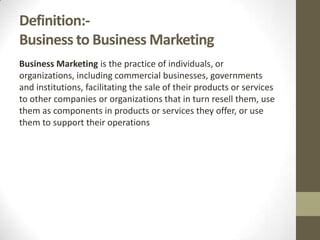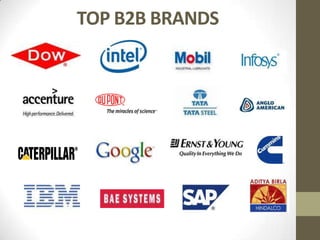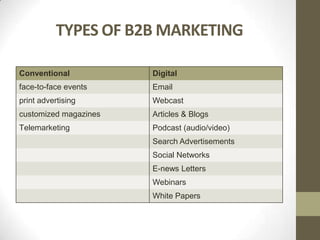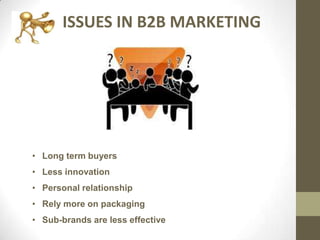B2B marketing and general mistakes.
- 1. Presented by: Desai Madhav Ashutosh
- 2. BUSINESS TO BUSINESS MARKETING
- 3. Definition:Business to Business Marketing Business Marketing is the practice of individuals, or organizations, including commercial businesses, governments and institutions, facilitating the sale of their products or services to other companies or organizations that in turn resell them, use them as components in products or services they offer, or use them to support their operations
- 5. INDUSTRIAL VS CONSUMER MARKETING Areas of Difference B2B Market Consumer Market Market Characteristics Geographically Concentrated Geographically Disbursed Relatively Fewer Buyer Mass Market Technical Complex Standardize Product Characteristic Customized Service Characteristic Service , timely Availability extremely Important Somewhat Important Buying Behavior Involvement of Various functional area from both the ends Involvement of family members Purchase Decisions are performance based and rational Purchase decisions are mostly based on Physiological /social/psychological needs Technical Expertise Relatively less technical expertise is required Stable Interpersonal relationship Non- Personal relationship
- 6. INDUSTRIAL VS CONSUMER MARKETING Areas of Difference Industrial Market Consumer Market Channel Characteristic More Direct Indirect Fewer Intermediaries Multiple layer of Intermediaries Promotional Characteristic Emphasis on Personal Selling Emphasis on Mass Media (Advertising) Price Characteristic Competitive Bidding and Negotiated Prices List Price or MRP List Price for Standard Products
- 7. B2B DISTRIBUTION CHANNEL CHARACTERISTICS Manufacturer Company Sales Force Representative Agency Distribution Dealer Customer Customer Customer
- 8. TYPES OF B2B MARKETING Conventional Digital face-to-face events Email print advertising Webcast customized magazines Articles & Blogs Telemarketing Podcast (audio/video) Search Advertisements Social Networks E-news Letters Webinars White Papers
- 9. DIGITAL MEDIA FOR MARKETING
- 10. Problem Recognition General Description of Need Product Specification B2B BUYING PROCESS Supplier Search Acquisition & Analysis of Proposal Supplier Selection Selection of Order Routine Performance Review
- 11. ORGANIZATIONAL BUYING SITUATIONS Straight Rebuy The buyer routinely re-orders the same product or service with out any modification Modify Rebuy The buyer wants to modify product specifications, price, service or supplier New Task The buyer purchase product or service for the first time
- 12. THE NATURE OF INDUSTRIAL BUYING AND BEHAVIOR Organizational Buying Behavior Environmental Forces Economic Technology Global Trade Relations Organizational Forces Goals , Objective & Strategies Group Forces Roles, relative influence, and interaction pattern of buying decision participants Individual Forces Job Function, Past Experience, and buying motives of individual decision participants
- 13. BUYING CENTER
- 14. ROLES OF BUYING CENTER Initiator :- Recognition of Problem or Need Buyer :- Obtains the quotation Supplier evaluation & Selection Processing purchase order Expediting deliveries Implement the purchasing policies of the organization User of Product/ Services ( Could be Initiator) User:Influencer :Gatekeepers:Deciders:- Individuals who could influence the purchasing decision ( Technical / Design Engineers / External consultants ) Individuals who control the flow of information to the members of buying center Individuals or group of people who make the actual purchase decisions about the product or services
- 15. GOAL OF PURCHASING • Uninterrupted Flow Material • Manage Inventory • Improve Quality • Developing and Managing Supplier relationships • Achieve Lowest total cost • No or Less mediatory
- 16. ISSUES IN B2B MARKETING • Complex decision making units
- 17. ISSUES IN B2B MARKETING • Limited number of buying unit
- 18. ISSUES IN B2B MARKETING • Long term buyers • Less innovation • Personal relationship • Rely more on packaging • Sub-brands are less effective
- 19. MISTAKES IN DIGITAL B2B MARKETING 1. Ignoring social media reach of your business • Reach is an often overlooked metric by B2B marketers who are focused on generating high-quality leads often at lower volume due to the high average sale price for many B2B deals. 2. Posting Regularly On Social Media • Companies need Social Media Marketing because it is the primary vehicle for customer engagement. • It enables customers to build long-term relationships • Participate in two-way conversations • Gains access to support and customer service. You don’t need to be on every social network. In other words, as a B2B you are wasting your time on Facebook, Pinterest or Instagram.
- 20. MISTAKES IN DIGITAL B2B MARKETING 3. Not Trying To Generate Lead • Social media can have many applications for a business, including customer service, public relations, and recruiting. But when it comes to marketing, B2B social media is about lead generation 4. Blabbering About Boring Products • A huge difference exists between generating leads with social media and publishing boring, product-focused content. Social media doesn't make your business interesting; that's your job. 5. Hiring the Same Old Marketer • Social media can have many applications for a business, including customer service, public relations, and recruiting. But when it comes to marketing, B2B social media is about lead generation
- 21. TARGET AUDIENCE MISTAKES IN ‘LinkedIn’
- 22. MISTAKE 1
- 23. MISTAKE 2
- 24. CONCLUSION























